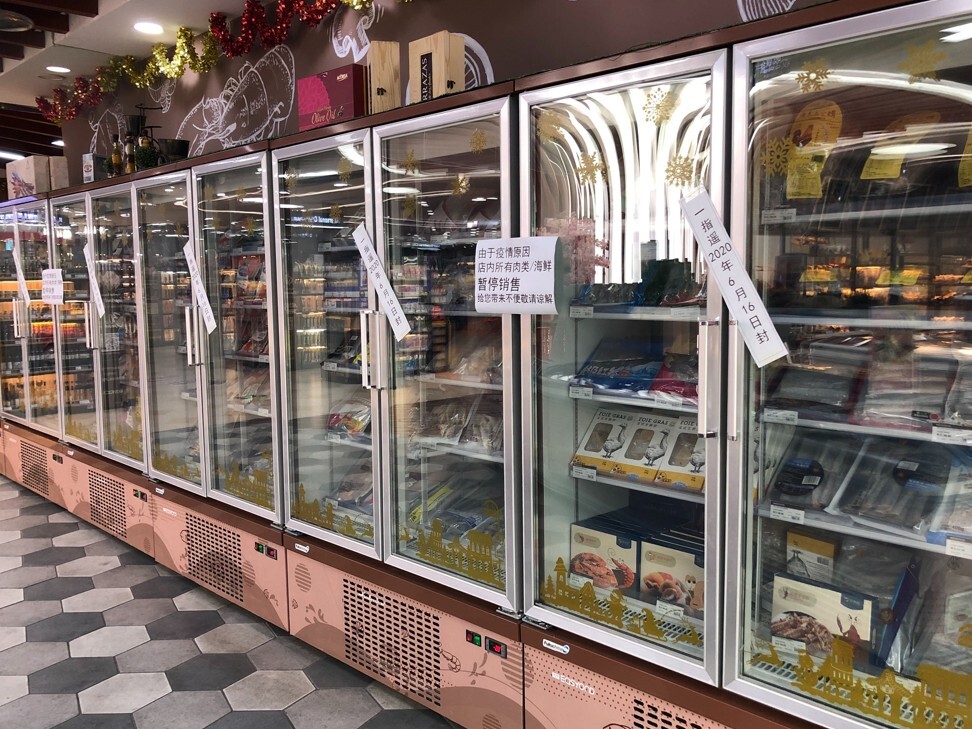
Coronavirus: China’s freeze on imported salmon stirs concern about wider impact on European food trade
- The European Commission says China has not banned salmon imports, but supermarket shelves in Beijing have been cleared of foreign fish and meat
- Traders say imports were frozen after the virus was discovered on chopping boards used for imported salmon at Beijing’s Xinfadi market
Seafood traders in China are bracing for a “psychological blow to consumption” and the possibility of wider disruption to imported proteins after Beijing halted shipments of European salmon amid fears it may be the source of a new coronavirus outbreak.
While a European Commission spokesman said “there is no formal ban or import restriction in place”, traders have confirmed Beijing has stopped imports of all fresh products. European exporters are now anxiously waiting for clarification.
“We have not had contact with local authorities. Our understanding is that the current situation is causing some logistical implications for fresh salmon to the market,” said Victoria Braathen, China director at the Norwegian Seafood Council.

“We are monitoring the development in the market closely. The Norwegian Food Safety Authority is clear that the coronavirus does not affect seafood safety as there are no known cases of infection via contaminated food, imported food or water.”
Nonetheless, salmon, along with other imported meat and seafood products, has been removed from the shelves of major supermarkets across China while authorities test meat and seafood imports for traces of the virus.
A European diplomatic source said “countries that do not produce salmon shouldn’t be too worried”.
“But if it turns into a government-fuelled hysteria that Europe is the source of the virus, and that European Union products may be tainted with Covid-19, I will be very concerned about the effects on imports,” said the official, who did not want to be named.

01:58
Salmon import ban and partial lockdown for Beijing after new Covid-19 cases in Chinese capital
Live oysters are air freighted from their home markets, meaning orders can be placed or cancelled with a very short lead time. Frozen products, on the other hand, can be on the sea for six weeks, so the effect on purchases will not be immediately clear.
European air freight carrier Cargolux said in an internal memo seen by the South China Morning Post on Monday that “a temporary ban has been put on all perishable shipments (e.g. fresh meat, fresh fish, vegetables, seafood and fruits)” to various airports in China.
Another European import promotion official in China, who did not want to be identified, said: “Like any health scare of this type in China, it can have some, generally short term, impact for some products.
“If the concern moved to other imported proteins it could have an impact on meat imports but I don’t expect that to happen for now.
“The potential impact will become clearer over the next few days. Items like oysters, since they are a live product, should show the impact very quickly.”
Shi Guoqing, deputy director of the emergency centre at the Chinese Centre for Disease Control and Prevention, said on Tuesday there was no evidence that salmon was the host or intermediate host of the coronavirus.
Despite the assurance, salmon’s appeal in the world’s biggest consumer market was likely to take a hit, analysts said.
“Consumer sentiment has been affected and no one will want to buy salmon now,” said Rosa Wang, a commodity analyst at Shanghai-based research house JCI China.
Even though salmon has been finally proven to be free of the virus, it will take a long time for people to resume eating it
“Even though salmon has been finally proven to be free of the virus, it will take a long time for people to resume eating it. So no matter if China bans salmon imports or not, salmon consumption will be badly hit in China.”
China’s purchases of frozen seafood from overseas have soared in recent years. It imported US$461 million of frozen fish in April, customs data showed, but there was no official breakdown for salmon.
Norway is the world’s biggest salmon exporter, followed by Chile. While its primary exports are giant volumes of crude oil and petroleum products from their North Sea fields, fresh and frozen fish products come next. In the first five months of the year, it shipped 9,600 tonnes of salmon to China, a 5 per cent decrease on the previous year due to the coronavirus, according to the Norwegian Salmon Council.
“China was the largest growth market for Norwegian salmon in 2019, and when circumstances are back to normal, we look forward to further developing the China market for Norwegian salmon,” said Braathen at the Norwegian Seafood Council.
A trader at agrifood giant Cargill said that while there could be some impact on its seafood business in China, it was still early, so the impact would be limited.
A Shanghai-based frozen food importer, who would only give his family name Zhu, said the outbreak in Beijing could deliver a “psychological blow to consumption”.
“We cannot rule out the possibility that consumers will have some resistance to imported food, but that might depend on following reports about the infection,” he said, adding that he did not expect customs disruptions, nor had he planned to make major changes to his daily operations.
Other businesses, however, have quickly begun distancing themselves from the new outbreak.
Jiarui Fine Food, an importer and distributor of French oysters in China, issued a certificate declaring that “our office and warehouse are not set up in Xinfadi Market, all our staff have never been to Xinfadi Market”.

02:17
Beijing district in ‘wartime emergency mode’ after spike in local Covid-19 cases
“All the staff of our company will complete the nucleic acid test before June 17,” said the document, which carried the company's official seal.
In an interview with the state-run Securities Times, Tang Jie, the chairman of Joyvio Agricultural Development (Agri-Joyvio), said the outbreak would not change long term demand among Chinese consumers for seafood.
Norwegian salmon exporters have seen their stock prices plunge in response to the crisis. Since the outbreak at the weekend shares in Salmar fell 5.2 per cent, Grieg Seafood by 3.7 per cent, Norway Royal Salmon by 5.7 per cent, Mowi 5.3 per cent and Bakkafrost by 7.9 per cent.
The Chinese office of the world’s largest salmon producing company, Mowi, did not want to comment when contacted by the Post.
Salmon exporters in Norway and around Europe also declined to respond to questions, saying that they did not want to comment given the uncertainty of the situation.



